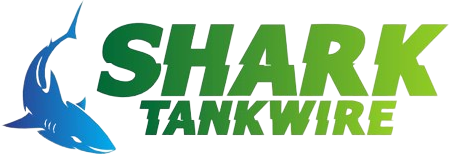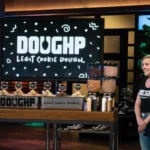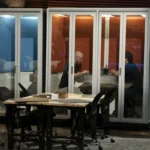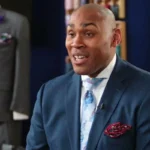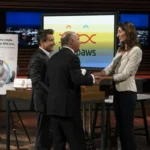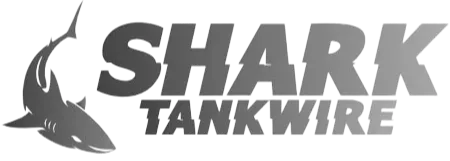What is the latest update on Retold Recycling after their appearance on Shark Tank Season 14? Retold Recycling, a California-based textile recycling company, successfully secured a $300,000 investment from Mark Cuban for 25% of their company on Shark Tank Season 14. They have since expanded their product offerings and have been working towards making textile recycling more accessible and convenient.
Summary
- Retold Recycling appeared on Shark Tank Season 14, seeking $300,000 for 15% equity.
- Mark Cuban invested $300,000 for 25% of the company.
- The company aims to make textile recycling easy and accessible.
- They offer various subscription options and have expanded their product line.
- Retold Recycling continues to grow and raise awareness about textile waste.
Retold Recycling Shark Tank Update | Shark Tank Season 14
Retold Recycling, a California-based startup, was founded with a clear mission: to revolutionize textile recycling and divert clothing and household textiles from landfills.
Their vision is a world where unwanted clothing and textiles are seen as valuable resources, not waste.
By offering a convenient and accessible mail-in recycling service, they aim to empower individuals to make a positive environmental impact with their unwanted items.
The Textile Waste Problem
The global fashion industry is a major contributor to environmental pollution. Textile waste is a significant issue, with millions of tons of clothing and textiles ending up in landfills each year.
This not only wastes valuable resources but also contributes to greenhouse gas emissions and soil contamination. Retold Recycling recognized this urgent problem and sought to provide a solution.
Retold Recycling’s Solution
Retold Recycling offers a simple and effective solution to the textile waste problem. Their mail-in recycling service allows customers to send in any unwanted clothing or household textiles, regardless of their condition.
These items are then sorted, cleaned, and processed for reuse, upcycling, or responsible recycling. This diverts textiles from landfills, reduces the demand for new materials, and promotes a circular economy in the fashion industry.
Shark Tank Season 14 Appearance
1. The Pitch
| Entrepreneurs | Amelia Trumble and Alan Yeoh |
|---|---|
| Business | Retold Recycling |
| Ask | $300,000 for 15% equity |
| Deal | $300,000 for 25% equity |
| Sharks | Mark Cuban |
| Season | 14 |
| Original Air Date | October 21, 2022 |
| Website | Retold Recycling |
| Key Points of Pitch |
|
| Why Sharks Accepted |
|
2. Negotiations and Counteroffers
During their Shark Tank appearance, Amelia and Alan faced tough questions and negotiations from the Sharks.
Some Sharks expressed concerns about the scalability of the business and the potential for competition.
However, Mark Cuban saw the potential in Retold Recycling’s mission and business model. He offered $300,000 for 25% equity, a counteroffer that Amelia and Alan ultimately accepted.
3. Mark Cuban’s Investment: $300,000 for 25%
Mark Cuban’s investment provided Retold Recycling with a significant boost. Not only did it inject capital into the business, but it also brought valuable expertise and exposure.
Cuban’s involvement helped raise awareness about the company’s mission and opened doors for new partnerships and opportunities.
Retold Recycling After Shark Tank
1. Expansion of Product Offerings
Since their appearance on Shark Tank, Retold Recycling has expanded its product offerings to cater to a wider range of customer needs.
Initially offering single bags for one-time recycling, they now provide various bag sizes and subscription options to make textile recycling a regular habit.
This expansion allows customers to choose the most convenient and cost-effective way to responsibly dispose of their unwanted textiles.
2. Subscription Options
Retold Recycling’s subscription options are designed to make textile recycling a seamless and ongoing process.
Customers can choose from quarterly or annual subscriptions, receiving a set number of bags regularly.
This not only simplifies the recycling process but also encourages customers to regularly declutter their closets and divert textiles from landfills.
3. Sustainable Merchandise
In addition to their recycling services, Retold Recycling has introduced a line of sustainable merchandise.
These products, made from recycled materials, further promote their commitment to sustainability and provide customers with eco-friendly alternatives for their everyday needs.
The merchandise line includes tote bags, sweatshirts, and other items that align with the company’s values.
4. Partnerships and Collaborations
Retold Recycling has actively sought partnerships and collaborations to expand its reach and impact.
They have partnered with various brands and retailers to offer textile recycling solutions at the point of purchase.
This allows customers to easily recycle their old clothes when buying new ones, further promoting responsible consumption and reducing textile waste.
Impact and Growth
1. Increased Awareness of Textile Waste
Retold Recycling’s appearance on Shark Tank and subsequent growth have significantly increased public awareness about the issue of textile waste.
Through their marketing efforts, social media presence, and partnerships, they have educated consumers about the environmental consequences of discarding clothing and textiles.
This heightened awareness has led to a greater demand for sustainable disposal options and a shift in consumer behavior towards more responsible consumption.
2. Diversion of Textiles from Landfills
Retold Recycling has successfully diverted a substantial amount of textiles from landfills.
By providing a convenient and accessible recycling service, they have empowered individuals to take action and contribute to a more sustainable future.
The company’s impact is measurable, as they regularly report the tonnage of textiles they have saved from ending up in landfills.
This tangible impact demonstrates the effectiveness of their solution and inspires others to join the movement.
3. Positive Environmental Impact
The diversion of textiles from landfills has a significant positive environmental impact.
It reduces greenhouse gas emissions associated with textile decomposition, conserves resources by reducing the need for new materials, and decreases pollution caused by textile production and disposal.
Retold Recycling’s efforts contribute to a circular economy, where resources are reused and recycled, minimizing waste and environmental harm.
4. Financial Growth and Projections
Retold Recycling has experienced significant financial growth since its Shark Tank appearance.
The investment from Mark Cuban, coupled with increased demand for their services, has fueled their expansion and allowed them to invest in infrastructure, marketing, and partnerships.
The company’s financial projections are promising, as they continue to attract new customers, expand their product offerings, and forge strategic collaborations.
Their success demonstrates the viability of sustainable business models and the growing market for eco-friendly solutions.
Challenges and Future Plans
1. Scalability and Logistics
As Retold Recycling continues to grow, ensuring scalability and efficient logistics remains a key challenge.
The company must invest in infrastructure and processes to handle an increasing volume of textile waste effectively.
This includes optimizing sorting, cleaning, and processing facilities, as well as streamlining transportation and distribution networks.
2. Consumer Education and Engagement
Educating consumers about textile waste and the importance of recycling remains a priority for Retold Recycling.
They actively engage in campaigns and initiatives to raise awareness, provide information, and encourage behavior change.
This involves partnering with schools, businesses, and communities to reach a wider audience and promote sustainable practices.
3. Competition in the Recycling Industry
The recycling industry is becoming increasingly competitive, with more companies offering similar services.
Retold Recycling must differentiate itself by focusing on innovation, customer service, and environmental impact.
This involves continuously improving their processes, offering unique features, and building strong relationships with customers and partners.
4. Expansion Goals and Targets
Retold Recycling has ambitious expansion goals, aiming to reach a larger audience and further reduce textile waste.
This involves expanding their geographic reach, partnering with more retailers and brands, and investing in marketing and outreach efforts.
They also aim to increase the volume of textiles they recycle and explore new avenues for reuse and upcycling.
Customer Reviews and Testimonials
1. Positive Feedback on Convenience and Impact
Retold Recycling has received overwhelmingly positive feedback from customers who appreciate the convenience and impact of their service.
Many customers praise the ease of the mail-in process, the variety of recycling options, and the company’s commitment to sustainability.
They feel empowered to make a difference and are grateful for a simple way to responsibly dispose of unwanted textiles.
2. Success Stories of Textile Recycling
Retold Recycling regularly shares success stories highlighting the impact of their service.
These stories showcase how recycled textiles have been transformed into new products, donated to those in need, or used to create sustainable materials.
These examples inspire others to participate in textile recycling and demonstrate the positive outcomes that can be achieved through collective action.
3. Community Engagement and Support
Retold Recycling actively engages with its community, fostering a sense of shared purpose and collective responsibility.
They organize events, workshops, and educational programs to raise awareness and encourage participation in textile recycling.
The company also partners with local organizations and businesses to promote sustainability and create a positive impact in the community.
FAQs
How does the Retold Recycling process work?
It’s simple! Order a Retold Recycling bag, fill it with your unwanted clothing and textiles (any condition), and ship it back using the provided prepaid shipping label.
What types of textiles can be recycled?
Retold Recycling accepts all kinds of clothing and household textiles, including worn-out items, single socks, stained fabrics, and even scraps from sewing projects.
How can I get involved with Retold Recycling?
You can participate by using their recycling service, purchasing their sustainable merchandise, or spreading the word about textile waste and the importance of recycling.
What are the benefits of textile recycling?
Textile recycling helps reduce waste in landfills, conserve resources, decrease pollution, and promote a more sustainable fashion industry.
Where can I purchase Retold Recycling products?
You can find their sustainable merchandise, including tote bags and apparel, on their website.
The Bottom Line
Retold Recycling is more than just a recycling service; it’s a movement towards a more sustainable future. By offering a convenient way to recycle unwanted textiles, they empower individuals to make a positive impact on the environment. The company’s growth, impact, and positive customer feedback demonstrate the effectiveness of their solution and the growing demand for responsible consumption and disposal practices.
Retold Recycling’s journey is a testament to the power of entrepreneurship, innovation, and a commitment to sustainability. As they continue to expand and evolve, they remain dedicated to their mission of diverting textiles from landfills and creating a more circular economy. By choosing Retold Recycling, consumers can contribute to this important mission and join the movement towards a more sustainable future for fashion.
